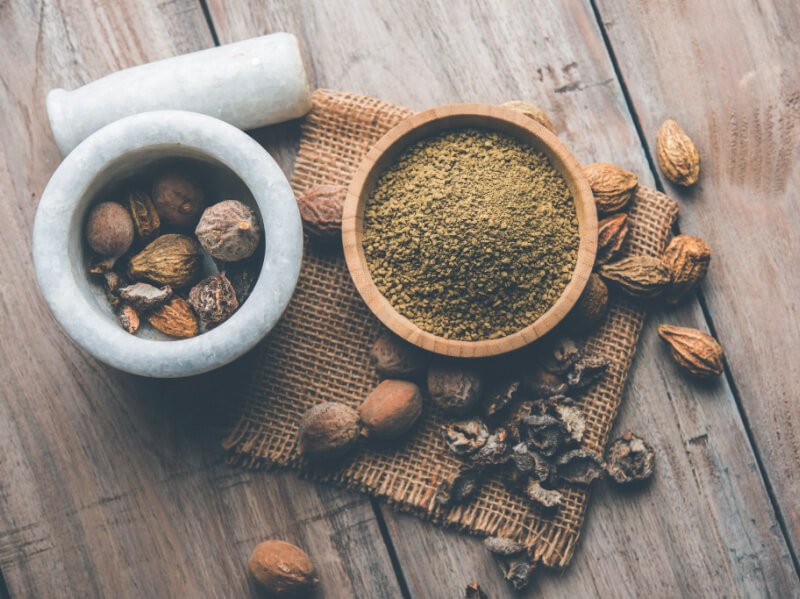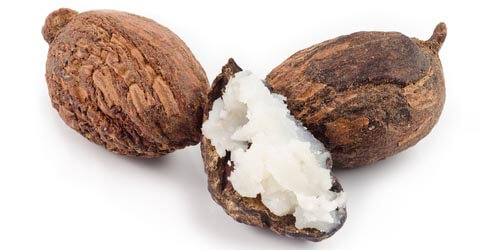Triphala is most known for balancing digestion, and it has a laxative effect. Triphala isn‘t just one herb, but a name used for an age-old mix of three Indian fruits: Haritaki (Terminalia chebula), bibhitaki (Terminalia bellirica) and amalaki (Emblica officinalis) in equal proportions.
Are You Motherless?
Triphala is one of the oldest and most famous herbal mixtures in India but in the last decades, it‘s been getting more popular in the western world. An Indian proverb describes people‘s belief in Triphala very well: „ No mother? Don‘t worry so long as you have Triphala!“. Amalaki, one of the fruits in Triphala contains considerably more vitamin C than oranges and the vitamin C is heat-resistant, so the belief in Triphala is not misplaced.
Triphala Balances Digestion
I‘ve used Triphala on patients in my consultation for many years with very good results and it‘s the only standardised herbal mixture that I use, everything else I blend myself. I‘ve mostly used Triphala as a laxative along with other herbal mixtures that I make myself, and it has worked well against bloating and constipation. Triphala also works well for indigestion, high stomach acid, flatulence and spastic colon.
Through the years I‘ve also treated ulcerative colitis, a condition where the main symptom is diarrhea, and I‘ve seen Triphala have a very positive effect on it. Therefore I can say with confidence that Triphala is very effective in balancing digestion, and it seems to suit everybody because I‘ve hardly seen any side effects caused by it. For Triphala to be effective, the dosage is important, and I usually give patients 4.000 mg a day of organic Triphala tablets.
- Balances digestion
- Constipation and bloating
- Indigestion and high stomach acid
- Spastic colon and flatulence
- Ulcerative colitis
Triphala Is Antioxidative and Anti-Inflammatory
Antioxidants are substances that can hinder or slow down the oxidation of other substances. Through oxidation, substances called free radicals form that can cause damage in living cells and spoil food. Antioxidants, however, decrease the damaging effects of free radicals, while also being anti-inflammatory. Triphala has an antioxidative and anti-inflammatory effect and there‘s a long tradition of using it to treat inflammatory and rheumatic diseases. Furthermore, Triphala is known for being effective for sore throat and gingivitis, both internally and as a mouthwash.
Triphala Could Help You Lose Weight
Research on patients with obesity over a three-month period showed that those who were given Triphala lost more weight than those who were given a placebo. Research has also shown that Triphala has a positive effect on type 2 diabetes. Those who are too heavy are at more risk of developing diabetes.
Eye Diseases and Cavities
There‘s a long tradition of using Triphala to strengthen eyes and treating eye diseases. It has a positive effect on glaucoma, cataracts and blepharitis, both through intake and as eyewash. Furthermore, research on individuals with eyestrain caused by computer usage has shown that Triphala eye drops reduce eye strain. Triphala is also known for reducing cavities: clinical studies have shown that mouth wash made from Triphala has an anti-bacterial effect in the mouth and reduces tartar, gingivitis and plaque.
It Strengthens the Heart and Slows the Formation of Wrinkles
Triphala has a high content of antioxidants and everything points to the fact that antioxidants can prevent cardiovascular diseases, reduce the risk of blood clots and hardening of the arteries and slow down the forming of wrinkles. Although Triphala taken internally can help reduce wrinkles and fine lines I highly recommend using good moisturizers externally. This duo gives long-lasting hydration for mature skin. Studies have also shown that Triphala can lower blood pressure and high cholesterol.
Triphala Can Protect Against Cancer
The high content of antioxidants in Triphala is believed to have an inhibitory effect on the growth of cancer cells. Many studies on Triphala in test tubes and on animals have led to this conclusion. These studies have for example shown the inhibitory effect of Triphala on lymphoma, colon cancer, prostate cancer, stomach cancer and pancreatic cancer.
Dosage
I recommend 4.000 mg a day of organic Triphala tablets. Take two 1.000 mg tablets with your breakfast and two 1.000 mg tablets one hour after dinner.
Research
Triphala has been studied extensively but all three fruits in Triphala have also been studied separately.
- Two clinical studies have shown that mouth wash made from Triphala has an anti-bacterial effect in the mouth and reduces tartar, gingivitis and plaque.
- Research on 62 obesity patients over a three month period showed that those who were given Triphala lost more weight than those who were given a placebo
- Research on healthy individuals showed that Triphala strengthens the immune system and could be useful for those with HIV/AIDS.
- Research on 141 individuals with eye strain caused by computer usage has shown that Triphala eye drops reduce eye strain.
- Research on 150 patients with type 2 diabetes showed that Triphala lowered their blood sugar
The abovementioned studies were clinical (done on people) but there have also been test tube studies and studies on animals. These studies have for example shown that Triphala:
- Strengthens the immune system, protects against radiation and inhibits the growth of cancer cells
- Is anti-inflammatory, antioxidative, anti-bacterial, anti-viral and fungicidal
- Lowers high stomach acid and is laxative
- Lowers blood pressure, blood sugar and cholesterol
- Heals cuts and has a positive effect on rheumatic diseases and urinary infections
- Has a positive effect on cataracts, lowers stress and reduces cavities
About the Author
Anna Rósa is a medical herbalist and author of the bestselling book Icelandic Herbs and Their Medicinal Uses. She’s the CEO and founder of Anna Rósa Skincare and a member of the National Institute of Medical Herbalists in UK. It’s the oldest herbalist institute in the world, founded in 1894.































Where to purchase?
There are so many good products out there! This is the one I use: https://www.iherb.com/pr/planetary-herbals-ayurvedics-triphala-1-000-mg-120-tablets/56290